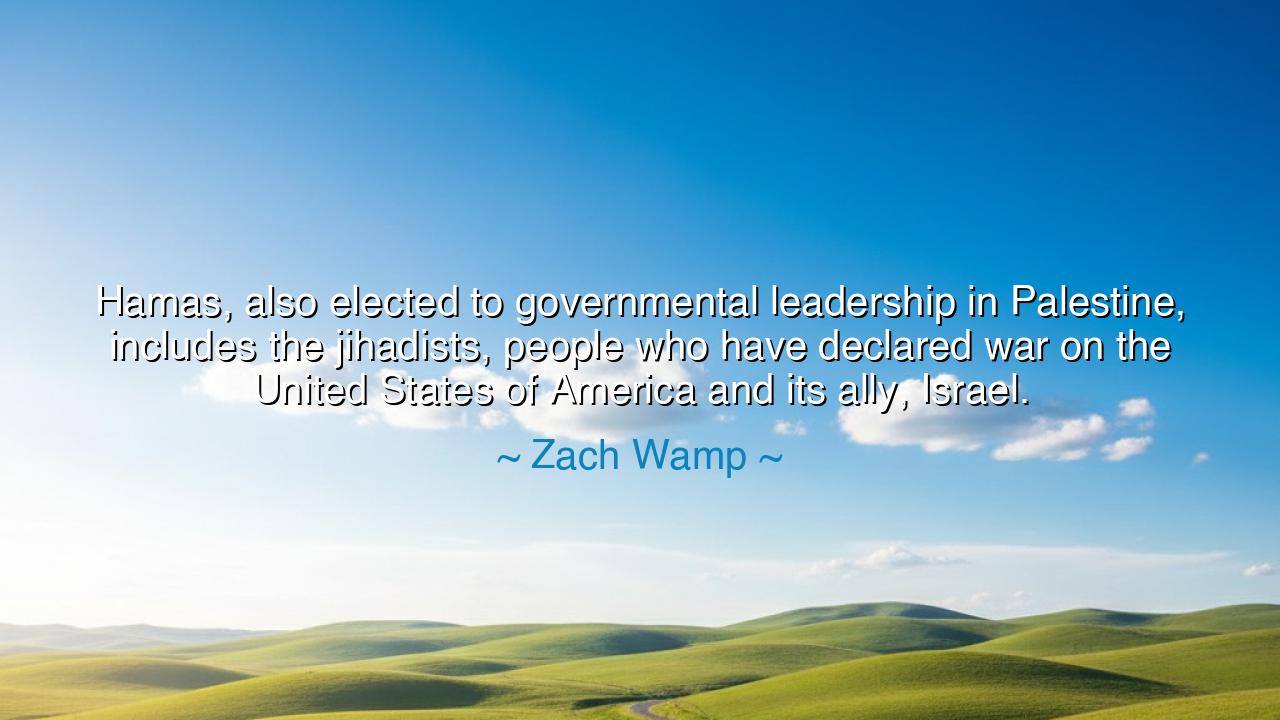
Hamas, also elected to governmental leadership in Palestine
Hamas, also elected to governmental leadership in Palestine, includes the jihadists, people who have declared war on the United States of America and its ally, Israel.






In the grave and unflinching words of Zach Wamp, we hear not merely a statement of politics, but the echo of an ancient struggle between order and chaos, between those who build and those who destroy. He declared: “Hamas, also elected to governmental leadership in Palestine, includes the jihadists, people who have declared war on the United States of America and its ally, Israel.” Behind these words lies both warning and lament — for they speak of the peril that arises when the instruments of governance fall into the hands of those who wage war not only with armies, but with hatred itself.
The origin of this quote lies in the turbulent years following the early 2000s, when Hamas, a militant organization born from the fires of conflict, rose to political power in Palestine. Its ascent was a paradox that confounded the world — for the same movement that built schools and hospitals also launched rockets and called for blood. Zach Wamp, a voice of conscience in American politics, spoke these words to awaken awareness: that the mantle of leadership does not cleanse the heart of violence, and that election does not equal virtue. He reminded his listeners that when the sword takes the throne, peace becomes a distant dream.
His declaration that Hamas “includes the jihadists” is not merely a condemnation of one group, but a reflection on the nature of extremism itself. For whenever an ideology is consumed by hatred, it loses its humanity. The ancient philosophers warned that a man who wars against others without mercy becomes enslaved by his own rage — and a nation ruled by such men will know no peace. The word “jihad”, though born in a spiritual sense to mean “struggle,” has been corrupted by some into a cry for destruction. Thus Wamp’s words stand as both political statement and moral warning: when faith becomes fire without wisdom, it burns the very people it claims to defend.
History has often repeated this tragic pattern. We may look back to the days of Rome, when zealots within the empire rose up, claiming divine purpose while bringing only ruin to their own cities. Or we might recall the French Revolution, when noble cries for liberty were consumed by the Reign of Terror, and the blade of righteousness turned upon the innocent. In each of these moments, leadership was seized by those who believed themselves agents of purity, yet their war brought only ashes. So too, in Wamp’s words, we are reminded that even when destruction disguises itself in the garments of governance, its essence remains the same — violence cannot rule without consuming all that it touches.
There is also in Wamp’s tone a defense of alliance, the bond between America and Israel, nations joined by shared ideals of democracy and faith in freedom. He calls upon the listener to see this alliance not as mere strategy, but as fellowship in principle. For the defense of civilization has always depended upon unity among those who cherish justice. The ancients taught that when cities stood divided, the enemy needed no army to conquer them — they fell by their own discord. Thus, his warning is not only against the enemy without, but the weakness within. If the free world loses its vigilance, it will one day wake to find that tyranny has been seated among its rulers.
Yet Wamp’s words are not only the cry of caution — they are also a call to resolve. He reminds us that evil, when it cloaks itself in legitimacy, must still be named for what it is. The truth must be spoken, even when it is difficult. For the road of peace is not paved by silence, but by clarity. When the world refuses to see violence for what it is, it becomes complicit in its spread. Just as a physician cannot heal a wound he refuses to acknowledge, so nations cannot defend their people if they deny the presence of the disease. Wisdom, then, demands both discernment and courage — the willingness to confront darkness without surrendering to hatred.
So let this be the teaching carried forth from Zach Wamp’s words: be wary of those who promise freedom through violence, or righteousness through vengeance. Remember that leadership is not proven by victory in battle, but by the ability to preserve life, justice, and dignity. And when the world trembles between peace and chaos, choose always the path that builds, not the one that burns. For though wars may end through might, only truth and compassion can bring lasting peace.
Thus, the voice of Zach Wamp resounds like that of an elder warning his descendants — that the greatest threat to civilization is not merely the sword of the enemy, but the corruption of the spirit that calls evil good and destruction leadership. Guard, then, your hearts and your nations. Stand firm in truth, and let your hands be guided by justice, not revenge. For the future belongs not to those who wage endless war, but to those who have the courage to seek peace without surrendering to falsehood.






AAdministratorAdministrator
Welcome, honored guests. Please leave a comment, we will respond soon